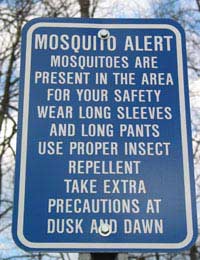Insects and Bugs Abroad

Probably the last thing you want to think about during your gap year is an army of creepy crawlies slipping inside your bags, your shoes, or even your clothes, but insects and bugs abroad will demand your attention.
At the very least insects and bugs can leave you bitten and uncomfortable, but their power extends far beyond a few bites. Insects and bugs can pass along life-threatening diseases, so guarding against them is essential. Take the necessary precautions, and hopefully you won't become their first feast.
Insects and Bugs Abroad
You may encounter a variety of insects and bugs abroad, some common or similar to those in the UK and some so exotic you may never have heard of them!A few of the insects or bugs you may meet include; ants, assassin bugs, bees, beetles, butterflies, deer flies, fire ants, fleas, gnats/midges, house flies, lice, mites, moths, mosquitoes, sand flies, spiders, ticks, true flies, tsetse flies and wasps.
Insect and Bug Borne Diseases
Probably the nicest thing an insect or bug bite will give you is a simple allergic reaction. Unfortunately, much more can be passed via these bites including serious diseases. Just a few of the diseases known to originate from insects and bugs abroad include:- Malaria - transmitted by mosquitoes.
- Yellow Fever - transmitted by mosquitoes.
- Dengue Fever - transmitted by mosquitoes.
- Typhus Fever - transmitted by ticks and lice.
- West Nile Virus - transmitted by mosquitoes.
- Plague - transmitted by fleas.
- Japanese Encephalitis - transmitted by mosquitoes and ticks.
- Lyme Disease - transmitted by ticks.
- Leishmaniasis - transmitted by sand flies.
- Chagas Disease - transmitted by assassin bugs.
- Sleeping sickness - transmitted by tsetse flies.
Avoiding Insect and Bug Borne Diseases
Thankfully, much is known about the diseases passed by insects and bugs and several immunisations do exist. Before you travel, discuss with your GP or local travel clinic the areas you will be visiting and solicit their advice on the travel immunisations including those for: Japanese encephalitis, Malaria (tablets) and Yellow Fever.Once you are travelling, there are many precautions you can take against insects and bugs. Every day make sure you wear insect repellent and cover up with trousers and long sleeved shirts, it is also a good idea to tuck your trouser into your socks and shoes to create a barrier. Wear a cap to protect your head and wear light coloured clothing that will make spotting an insect or bug easier.
Check yourself every day in the shower for new bites or bugs, if you do spot any bites or have a persistent fever or rash you should seek medical assistance immediately. Sleep under mosquito netting if advised and do remember to take your anti-malarial tablets as directed.
Treating Insect and Bug Bites
Some insect and bug bites will be harmless enough that you can treat them yourself by applying ice to the site, cleaning the site with soap and water and taking an antihistamine tablet or cream. Unfortunately, many people suffer from severe allergic reactions to insect and bug bites, so seeking medical help is necessary if you experience:- Shortness of breath.
- Pain or tightness in the chest.
- Wheezing or laboured breathing.
- Difficulty swallowing.
- Difficulty speaking.
- Physical weakness.
- Racing or slowed heart rate.
- The bite becomes infected.
- The bite is on your tongue or in your mouth.
- You receive multiple bites.
- Bites lead to a large or bulls-eye shaped rash.
- You suffer from an open wound.
- You become feverish.
- You just don't feel right and it would put your mind at ease to see a medical professional.
- Getting a Medical Appointment Abroad in Your Gap Year
- Nutrition and Health While Travelling
- The Importance of Proper Hydration
- First Aid and Kit For Travelling
- Sexual Health Issues Abroad
- Drinking Water Abroad
- Tips To Avoid Falling Ill on Your Travels
- Accidents and Injuries When Travelling
- Illness & Disease On Your Gap Year trip
- Jabs and Immunisations


Re: Sports Placements
Good Afternoon. My name is Muhammad Hasnain Khan. I am a 2nd year student at Leeds Beckett University studying Sports Coaching. I have checked…
Re: Hitch-Hiking and the Dangers
I think most personalize the experience and say hitchhiking is fine I’ve done it 20+ years with no issues, however it only takes…
Re: Hitch-Hiking and the Dangers
I think most personalize the experience and say hitchhiking is fine I’ve done it 20+ years with no issues, however it only takes…
Re: Hitch-Hiking and the Dangers
I think most personalize the experience and say hitchhiking is fine I’ve done it 20+ years with no issues, however it only takes…
Re: Hitch-Hiking and the Dangers
Having thought this over, I’ve realised the reason this post is so annoying is because of the stupid “safe vs. dangerous” binary…
Re: Hitch-Hiking and the Dangers
“hitchhiking puts travellers at the mercy of others” Yes. Unlike bus travel where you obviously know the driver and the other…
Re: Hitch-Hiking and the Dangers
Haha nice I think I feel so lucky right now as in over two years hh around the world I newer was robbed, killed not even subject…
Re: Hitch-Hiking and the Dangers
Agree with Masala. The dangers are being rather exaggerated. I was taught to hitch by a girl. Stay smart but don’t let fear limit…
Re: Hitch-Hiking and the Dangers
Been hitchhiking for almost 20 years, over 30 countries - Europe, Mid-east, South and Southeast Asia, Australia. I've had only one…
Re: Hitch-Hiking and the Dangers
Lady Hitchhiker and speakingasanexpert: If YOU want to take such stupid risks to your health, safety and possibly your lives,…